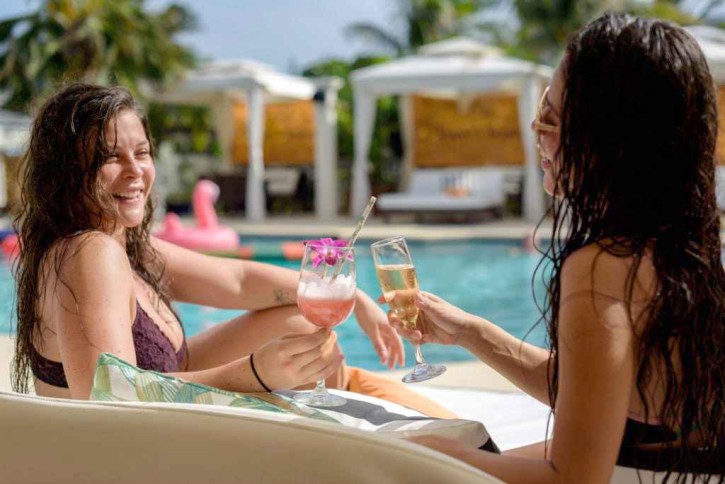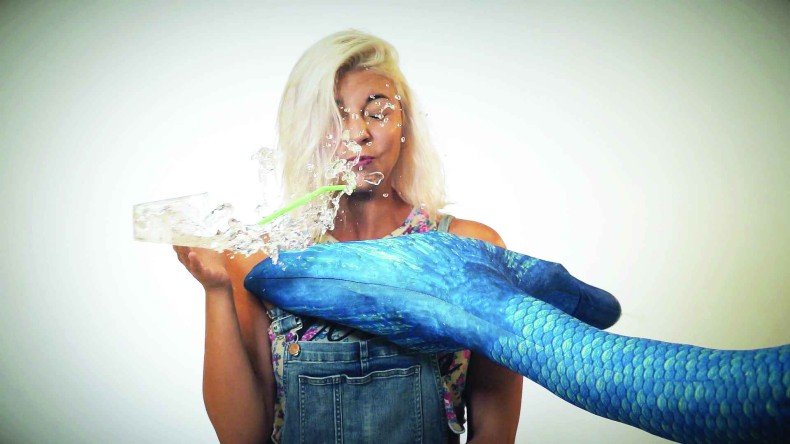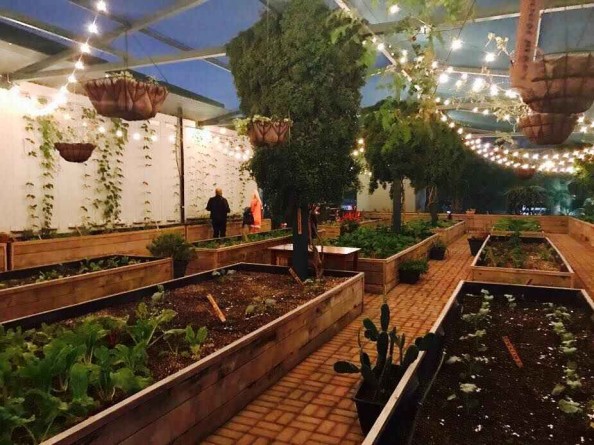The Last Straw
Those frozen margaritas and mudslides you love, with a straw poking jauntily out of the top may soon be a thing of the past.
 © Royal Palms
© Royal Palms
Panic not, the drinks that are for many synonymous with lazy days on the beach will still be as delicious as ever, but the disposable cups they come in and the plastic straws they’re served with are being phased out.
Cayman’s eco-sensitivity is at an all-time high with a growing number of residents and business owners taking the initiative to live a more sustainable life and reduce their dependence on single-use plastic. World-wide, environmental activists have advocated the need for sustainable practices and food sourcing and have warned against single-use plastics within the hospitality sector for decades. However, only recently has their plea gained momentum, pushing longstanding industry leaders to take action. For example, many international hotels have committed to implement a complete ban on single-use plastics globally by 2019, and Marriott Hotels have decided to remove all plastic straws and stirrers from all of their 6,500+ properties by 2019.
While some corporations are taking a stand, many concerned individuals are making us all more aware of the issues. Indeed, most of us would have seen the videos clips of marine life entangled in fishing nets, seabirds with stomachs full of plastic and the documentaries about depleted fish stocks. As a result there has been a collective realisation that urgent action is needed to protect our oceans and natural environment.
Here in Cayman, where turtles are such an integral part of the national heritage, the viral video of a turtle having a drinking straw extracted from its nostril hit particularly hard and has galvanised our small Island into action.

©Plastic Free Cayman
Plastic Free Cayman
One local Caymanian, Claire Hughes, felt so strongly about these issues that in July 2017 she founded Plastic Free Cayman, a non-profit organisation. Her vision is to eliminate all single-use plastics in Cayman, and while she acknowledges that, “some businesses have voluntarily made the switch”, she believes that, “a change in legislation will be the only way to completely phase them out.”
So rather than wait for legislation to happen, Plastic Free Cayman launched the Plastic Free 345 Pledge in November 2018 ñ an initiative which makes it easier for both businesses and individuals to commit to reducing single-use plastics.
The 345 Pledge for Businesses identifies ten operational changes that restaurants, bars and hotels can make to reduce unsustainable practices. These include committing to not give out plastic straws, cups, sachets and Styrofoam boxes, as well as making changes like allowing customers to bring their own to-go containers and having water refill stations. Hughes hopes the initiative will help to “change restaurateurs’ mind-sets that consumers want or need these single use plastic items.” More than a nod to the Islands’ area code, the 345 concept makes the pledge more achievable.
By signing up, restaurants pledge to implement three changes immediately, four within six months and five within a year. Participating restaurants display a decal on the door (see opposite page), identifying them as partners in the war on plastic. We urge our readers to seek out and support these businesses that are committed to preserving our fragile natural environment.
Do the Maths
Although official statistics on the usage of single-use plastics aren’t available for Cayman, consider this: one of Cayman’s favourite beach bars estimates that their mudslide drink alone uses 30,000 plastic cups and 30,000 plastic straws per year. Now multiply this to account for the number of drinks offered per establishment, the 290+ restaurants on-Island, and that Cayman has continued to see a record increase in the number of visitors, and it becomes easy to see how quickly something as small as a cup and straw can become a much larger problem. Fortunately, a growing number of responsible business owners and managers in the culinary sector are taking matters into their own hands, reducing the flow of discarded plastics in whatever way they can.
Royal Palms, the popular Seven Mile Beach hangout, became concerned after having members of the public regularly show staff handfuls of straws that they had picked up after morning beach walks. The initial response was to make more disposal bins available to patrons and change to black straws in the hope they would be noticed and picked up before reaching the ocean. However, the straws still showed up on the beach. After a steady stream of straw-wielding patrons, and seeing the video of a sea turtle having a drinking straw pulled from its nostril, Marketing Manager Emily Shaw decided to take action. In July 2017, Royal Palms became one of the first establishments to make the switch to paper straws, and also to using grade 1 recyclable plastic cups. They estimate that they have avoided using half a million plastic straws so far. They also made a memorable ‘fish slapping’ video to promote the initiative, which went viral. See photos above.

©Monica Walton of Vagabond Media
A still from the #dontsuck media campaign.
Rackam's, a well-known and loved seaside bar and restaurant in George Town, has simply stopped putting straws in drinks. This initiative allows patrons to make a conscious choice – which General Manager Julie Allan sees as a point of education and activism. If a customer does ask for a straw, they are given a paper one. “It was obvious to us that we had to do our part in the fight against plastic, no matter how small that may seem”, she said. “One less plastic straw in the sea is a step forward we are happy to take.”
The Kimpton Seafire’s restaurants Ave, Avecita and Coccoloba have taken a similar tack ñ they have committed to a Skip The Straw programme which only provides a compostable or metal straw if a guest specifically asks for one.
Kaibo, a local and tourist favourite on the north side of the Island, has already reduced its use of single-use plastics by 95%. They use only paper straws and recycled biodegradable to-go containers and are committed to a 100% reduction in single-use plastic by 2019.
Ragazzi and LUCA also try and avoid all plastics: they give out bamboo cutlery when asked for it, and all their to-go containers and straws are made of paper. They estimate that they recycle 90% of their glass. They buy as much local produce as they can get their hands on and have built relationships with local fishermen to source fresh fish. They also refuse to buy or serve grouper.
A number of restaurants have exuded creativity along with their commitment: at Casanova, Catch and Premier Crew you’ll be offered a pasta straw, at The Brasserie you’ll be sipping through a straw made from hay, while at Sunshine Grill you can opt for a biodegradable bamboo straw. And these are just a handful of the great stories we have heard!
But Michele Zama, owner of VIVO Restaurant in West Bay, summed it up perfectly when he said, "Running a sustainable restaurant is not expensive, we just pay the right price for sustainable and eco-friendly products. If a restaurant chooses to buy cheap and non-eco-friendly products, then it means someone else is paying for the balance on the cost of that productñ most likely the next generation."
A New Business Paradigm
Nicolas Franco, Marketing Manager at Anchor & Den in Cayman shared with us, “We are finding that discerning guests are expecting restaurants and hotels to demonstrate environmental responsibility related to the source of the food they are eating and other sustainability concerns. We believe that these guests are likely to take their patronage elsewhere if the business is not aligned with their own moral values.”
Excitingly, what this means is that even though no current national legislation obliges restaurants to reduce or recycle their plastic waste, Cayman’s restaurateurs have recognised that, as a top luxury dining and travel destination, eco-conscious patrons are demanding more action, and they must oblige.
Lisa Flowers, owner of The Brasserie restaurant said, “we have seen an increase in eco-conscious customers. They not only want to know where their food comes from, they want to know that it was grown and sourced in a natural way, with the least amount of impact on our environment."

But What About the Fish?
Cayman’s Department of Environment has put into place open and closed seasons for various seafoods, particularly grouper, lobster, conch and whelks, as a means of ensuring the long-term and sustainable use of marine resources. However, it has truly been the efforts of the Island's restaurants to ensure that the visitors and residents who enjoy eating in their restaurants, have a clear understanding of what choices are best for overall sustainability and which items to avoid due to overfishing or harmful farming practices.
The Nassau Grouper is a key example of a fish that was once incredibly populous around Cayman’s coral reefs but is struggling to recover having been aggressivewly overfished. These fish are one of the largest species that you’ll see while diving in Cayman, and they are also the friendliest of fish. Hailed ‘the puppy of the sea’, these inquisitive fish will always come and say hello, often swimming alongside you for the duration of your dive. Their loving personality is not the only reason all should steer clear of eating Grouper: without this iconic Caribbean fish Cayman’s reefs could collapse like other major reef systems have. Grouper also spawn in large groups, and this has made them an easy target for fisherman for decades. Thankfully in 2003, legislation was implemented to protect them during their spawning season, yet in recognition of the fact that Grouper do not reproduce until eight years of age, many restaurants across the Island including Ragazzi on Seven Mile Beach, Tukka in East End, KARoo in Camana Bay and Ristorante Pappagallo in West Bay, have agreed to not serve it for the foreseeable future.
Since 2011 over 30 restaurants have consistently partnered with the Cayman National Trust’s SeaSense programme, which aims to provide an easily identifiable icon on menus to help consumers make informed and environmentally positive seafood choices. The programme also helps restaurants reduce the demand for non- or less sustainable seafood items on menus and encourage the demand for invasive, and delicious, species such as Lionfish!
What About the Meat and Veg?
Eliminating straws and eating sustainable fish is just one part of the story. More and more diners have said that they would prefer to eat in a sustainable restaurant if given the choice. During the 1980s-2000s Cayman saw a heavy focus on imported goods as a result of a major shift in socio-economic factors on the Island, including an increase in visitors, a large expatriate population with varied palettes, and a drive for innovation within the culinary space. However, more recently a perfect storm (no pun intended) of the lack of local produce after Hurricane Ivan, and a much greater demand from both chefs and patrons for food transparency, has led to an explosion in local farming.
The Kimpton Seafire restaurants also align with this philosophy, working with local farmers Martin (West Bay) and Rob (Bodden Town), to ensure only the freshest and most flavoursome vegetables, greens, eggplants, edible flowers and herbs, are incorporated into their dishes.
In speaking with Dean Max, Chef at The Brasserie, he notes that product supply chains are one of the key concerns when living on-Island. Shipping issues often result in literally tonnes of produce and protein going bad before it even hits Cayman’s shores. He notes, “since 2010, in an effort to reduce the farm-truck-train-ship-truck route of much of the Island’s food, we’ve managed our own organic garden where we grow the staple vegetables we use in our kitchen. To address the concern over ingredients not typically found in Cayman we’ve used the garden as an experimental breeding ground – who would’ve thought that we’d be able to grow our own ginger, turmeric, dragon fruit, broccoli and bok-choy! Not only does this reduce pollution, but it encourages a longer-term strategy of local sustainable farming and the produce is tastier.”
In addition to encouraging local farmers to produce a wider variety of crops and livestock, this trend has also led to a number of restaurants starting their own rooftop, parking lot and patio gardens.

©The Brasserie's On-Site Edible Garden
The Future
The future is a win-win as chefs from across the Island can now: head to one of three markets for the freshest and arguably the most flavourful local produce; are more informed about sustainable seafood choices and are embracing the movement to rid Cayman of plastic. Does this mean that we won’t see straws again in the future? We don’t think so, but just as incandescent light bulbs are almost a thing of the past, we believe that plastic straws will be replaced with sustainable alternatives and we will be one step closer to leaving a better world for future generations.




